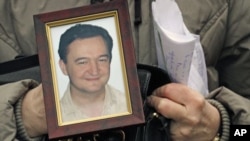The U.S. State Department has submitted to the U.S. Congress the first list of persons under the Magnitsky Act who are associated with the persecution and ultimate death of Sergei Magnitsky and other serious human rights abuses.
Sixteen of the 18 men and women are targeted for their role in the case of whistle-blowing Moscow lawyer Magnitsky. The 37-year-old Magnitsky died following nearly a year of pretrial custody after implicating Russian officials in a scheme to steal $230 million from the state.
The names include six persons who were placed there because of their position in the initial investigation and arrest of Magnitsky. They were senior investigators, supervisory, and other personnel of the Interior Ministry; one from the General Prosecutors Office; four judges from the Tverskoy District court in Moscow; two prison officials, one from the Matrosskaya Tishina prison, the head of the pre-trial prison detention facility there; the other the head of the pre-trial detention facility at Butyrka prison; plus two heads of tax authority offices. These people were associated with various stages of the campaign against Mr. Magnitsky.
The two others on the list not connected to the Magnitsky case are both from Chechnya. They are Kazbek Dukuzov, who is accused of murdering the corruption-exposing U.S. journalist Paul Klebnikov in Moscow in 2004 and Lecha Bogatyryov, who has been connected to the 2009 murder of Umar Israilov, a critic of brutal Chechen leader Ramzan Kadyrov.
The people on this list have had their assets in the United States blocked, and they will not be able to receive a U.S. visa.
Putting a name on this list is a serious undertaking with legal ramifications. The State Department said it had a "reasonable and demonstrable basis for doing so."
The United States believes there should not be impunity in Russia for those who violate human rights. The purpose of the Magnitsky Act is to support holding responsible those who are associated with Magnitsky's death and other serious violations of human rights. Human rights will continue to be an important aspect of the United States' relationship with Russia.
Sixteen of the 18 men and women are targeted for their role in the case of whistle-blowing Moscow lawyer Magnitsky. The 37-year-old Magnitsky died following nearly a year of pretrial custody after implicating Russian officials in a scheme to steal $230 million from the state.
The names include six persons who were placed there because of their position in the initial investigation and arrest of Magnitsky. They were senior investigators, supervisory, and other personnel of the Interior Ministry; one from the General Prosecutors Office; four judges from the Tverskoy District court in Moscow; two prison officials, one from the Matrosskaya Tishina prison, the head of the pre-trial prison detention facility there; the other the head of the pre-trial detention facility at Butyrka prison; plus two heads of tax authority offices. These people were associated with various stages of the campaign against Mr. Magnitsky.
The two others on the list not connected to the Magnitsky case are both from Chechnya. They are Kazbek Dukuzov, who is accused of murdering the corruption-exposing U.S. journalist Paul Klebnikov in Moscow in 2004 and Lecha Bogatyryov, who has been connected to the 2009 murder of Umar Israilov, a critic of brutal Chechen leader Ramzan Kadyrov.
The people on this list have had their assets in the United States blocked, and they will not be able to receive a U.S. visa.
Putting a name on this list is a serious undertaking with legal ramifications. The State Department said it had a "reasonable and demonstrable basis for doing so."
The United States believes there should not be impunity in Russia for those who violate human rights. The purpose of the Magnitsky Act is to support holding responsible those who are associated with Magnitsky's death and other serious violations of human rights. Human rights will continue to be an important aspect of the United States' relationship with Russia.




